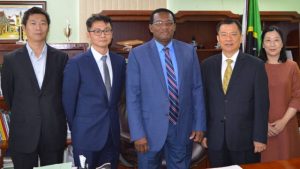
Minister Hamilton (centre), Mr. Tsai (second left), Ambassador Chiou (second right), along with other Taiwanese officials
The Renal Failure Disease Control and Prevention Project is expected to begin this month, offering better care to patients of chronic non-communicable diseases, particularly, kidney failure and improving strategies to reduce high incidences.
Against this backdrop, Feng-Ta Tsai, Project Manager, who arrived in the federation to oversee the proceedings, paid a courtesy call on the Honourable Eugene Hamilton, Minister of Health, on Monday, April 03.
Minister Hamilton welcomed Mr. Tsai and noted that he is quite pleased that the programme will commence. The health minister gave a brief overview of what the project entails.
“It will involve training of our people, it will involve our point of service being brought to the level where we can test for the persons who are at risk. Therefore, our persons who are out there should not fail to have themselves tested where necessary to determine whether they are candidates for renal failure,” said Minister Hamilton, while encouraging persons to get as much assistance as possible because hemodialysis in St. Kitts and Nevis is expensive. “None of us can afford to pay EC$120,000 a year on hemodialysis and so it is important that once this programme is up and running that those of you in the country, who may be likely candidates, you can get yourself tested so that there can be a programme set out for you so that you can avoid chronic failure of the kidneys.”
The health minister said that this is an important initiative because the “health profile of the country has been changing”, especially as it relates to renal health. He added that over the last 20 years the numbers have moved from zero to more than 100 persons who have some stage of renal disease.
Taiwan’s Resident Ambassador to St. Kitts and Nevis, His Excellency George Gow Wei Chiou, echoed similar sentiments as it relates to the project and expressed his government’s delight in having the honour of assisting St. Kitts and Nevis. He said that Mr. Tsai’s presence in the federation will be one of great significance.
“His coming represents a new era for our medical cooperation because late last year we signed an agreement for the renal failure disease control project and we are happy to say that after several months of preparation our new project manager has arrived in early April,” said Ambassador Chiou. “The purpose of this is not only to release the pressure on renal patients, but also to cooperate with your government to help the people to understand the best diet for their daily life and try to help the people to prevent renal failure disease.”
Minister Hamilton thanked Ambassador Chiou and the Government and people of the Republic of China (Taiwan) for such an important initiative, noting that the Government of St. Kitts and Nevis appreciates and welcomes the assistance.
He recalled his visit to Taiwan in October 2016, and said he was impressed with the staff and facilities at the Veterans General Hospital. He added that medical officials there seemed “very excited” by the prospect of partnering with colleagues from the twin-island federation.
In a posting titled “Best 100 Hospitals in Asia by Ranking” on www.iasisnet.eu, Taipei Veterans General Hospital is ranked as the second best. It is widely considered to be among the top 15 hospitals in the world.
